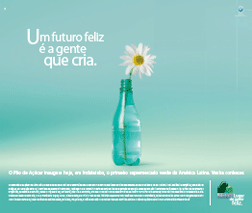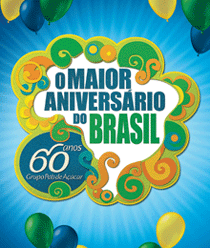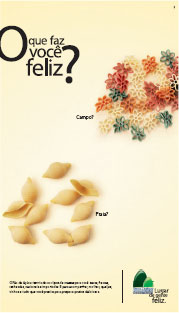| Society Advertising [PR6] Promotions and Events  Grupo Pão de Açúcar’s promotional activities are held in compliance with the two organs regulating such activities in Brazil – the Caixa Econômica Federal (CEF) and the Secretariat for Economic Monitoring (SEAE) – pursuant to Law 5,768 of December 20, 1971, and Law 10,683 of May 28, 2003, which regulate the rules and procedures relating to commercial promotions involving free distribution of prizes and the classification of these promotions under the types envisaged by Law 5,768/71. Grupo Pão de Açúcar’s promotional activities are held in compliance with the two organs regulating such activities in Brazil – the Caixa Econômica Federal (CEF) and the Secretariat for Economic Monitoring (SEAE) – pursuant to Law 5,768 of December 20, 1971, and Law 10,683 of May 28, 2003, which regulate the rules and procedures relating to commercial promotions involving free distribution of prizes and the classification of these promotions under the types envisaged by Law 5,768/71.The events conducted by the Promotion and Events area, which involved playing of music, were informed to the Central Copyright Collection and Distribution Office (Ecad), the government body responsible for copyright charges and payments relating to the public broadcast of Brazilian and foreign music. The required amounts were paid according to Federal Law 9,610 of February 19, 1998, which reaffirmed and expanded copyright owners’ rights relating to the creation and public broadcast of music. Media The advertising work done by PA Publicidade, the advertising agency of Grupo Pão de Açúcar, also complies with the legislation relating to the sector, which includes: a) Brazilian Advertising Self-Regulation Code: applicable to the creation, production and publishing and broadcast of advertisements. The enforcement authority is the National Advertising Self-Regulation Council (Conar). b) Standard Advertising Norms: applicable to business relations between advertising agents, clients, and communication vehicles. The enforcement authority is the Executive Council for Advertising Standards and Norms (Cenp).  Images ImagesThe photographs produced, purchased and rented for Grupo Pão de Açúcar respect the rights of the author, work and image, pursuant to Law 9,610 of February 19, 1998. All the work is based on agreements granting total rights or for a specified time period. Agreements with minors below 18 are signed by parents. Brochures  The paper used to print brochures is taxed according to applicable laws, except in cases of editorial publications envisaged by Law 1953 of December 21, 1977, in which cases the confirmation is obtained through a declaration from the printer about the origin of the paper. The paper used to print brochures is taxed according to applicable laws, except in cases of editorial publications envisaged by Law 1953 of December 21, 1977, in which cases the confirmation is obtained through a declaration from the printer about the origin of the paper.All printed communication complies with Federal Law 11,265/2006, which lays down about selling products for babies aged up to 11 months and 29 days, and first infants between 1 and 3 years. This law reaffirms the decisions contained in Anvisa’s Resolutions RDC 221 and 222/02 and provides for the inspection of establishments that manufacture and sell products for babies and first infants. Also, all printed communication contains the warning about the ban on sale of alcoholic drinks to minors below 18, in accordance with Article 81, II of the Statute of the Child and Adolescent. Radio, Television and Cinema (RTVC) agency complies with all the laws, norms, regulations and practices governing the advertising industry.
While producing films, the RTVC inserts all the statutory texts informing consumers about the period, validity, interest rate and mode of payment among other matters in the offers and promotions. Errata In order to preserve consumers’ right to correct information, in the rare cases of errors in printed material, PA Publicidade has a media plan by which it publishes an erratum in newspapers circulating in the area covered by the incorrect information. The erratum contains the name of the work, validity, list of stores, type of error, product name, other features, if required, the erroneous information published and the respective correction.  To facilitate the widest access to information, a placard is placed in the stores involved in the erroneous information, as described above. The notice is also placed close to the product. In both forms of communication, we always thank consumers and apologize for the possible inconvenience caused by erroneous information. In 2008, we published a few errata resulting from human errors in the review process. Promotions and events In 2008, Grupo Pão de Açúcar did not face any legal complaint relating to its campaigns. Global Compact In 2001, Grupo Pão de Açúcar was one of the first Brazilian companies to sign the Global Compact, a UN initiative launched in 2000 to encourage companies around the world to adopt in their operations values relating to human rights and labor rights, protection of the environment and the fight against corruption. More than 5,000 companies from 150 countries have already signed on to this voluntary program. Ever since it signed its commitment, Grupo Pão de Açúcar has been actively involved in adopting and disseminating the Global Compact principles. For example, in 2004, the bags of all the Grupo Pão de Açúcar supermarket and hypermarket banners had the ten Global Compact principles and the eight UN Millennium Development Goals printed as part of the dissemination of the two initiatives. Notable COP  One of the duties of the company as a signatory to the Global Compact is to communicate every year, through the Communication of Progress (COP), its progress in implementing the measures relating to the Compact’s principles. In 2005, Grupo Pão de Açúcar’s COP was considered by Global Compact as a ‘notable practice’ and the administration of Global Compact highlighted Grupo Pão de Açúcar’s efforts as a model to be followed by other companies. One of the duties of the company as a signatory to the Global Compact is to communicate every year, through the Communication of Progress (COP), its progress in implementing the measures relating to the Compact’s principles. In 2005, Grupo Pão de Açúcar’s COP was considered by Global Compact as a ‘notable practice’ and the administration of Global Compact highlighted Grupo Pão de Açúcar’s efforts as a model to be followed by other companies.The same year, Grupo Pão de Açúcar was invited to participate in the ‘Leading the way on Communication on Progress’ event organized by Global Compact in Geneva, in which four exemplary COP reports were presented. Grupo Pão de Açúcar was one of them - the only one from Brazil and the only one from the retail sector. Corruption [SO4] In compliance with the Global Compact’s recommendations on the issue, Grupo Pão de Açúcar seeks to prevent corruption among its employees. One of the measures in this regard is the internally circulated monthly report of infractions by type and banner, without disclosure of the names of the employees involved. Public policies and lobbies [SO5] Grupo Pão de Açúcar prepares, coordinates and monitors the progress on Bills, Decrees, Presidential Decrees and Terms of Technical Cooperation, Commitment, Adjustment of Conduct, among others, with the help of the legal department, in the best strategic interests of the Company. The Group also works, directly or through the supermarket industry associations, to defend some of these, always within the legal and ethical boundaries and in the common interest of the company, its shareholders, customers and society. Respect to Human Rights [HR6, HR7] [HR2] [HR1] All the agreements between Grupo Pão de Açúcar and its employees, suppliers and service providers exclude any possible disrespect to human rights in labor relations, such as child labor, forced labor or slave labor. Since 2008, Grupo Pão de Açúcar has extended its concern for human rights to its supply chain, and evaluates the respect for working conditions at the suppliers or companies contracted. In the area of Global Sourcing, it appraised 109 companies, around 25% of its total suppliers, on these requisites. Reseller agreements include a clause for the protection of personal liberties guaranteed by Brazilian Constitution. In 2008, the legal department analyzed 4,000 agreements, all of them with said clause. Thus, suppliers undertake not to explore any form of degrading work under the risk of rescission of the agreement by Grupo Pão de Açúcar. |
||||||||||||||